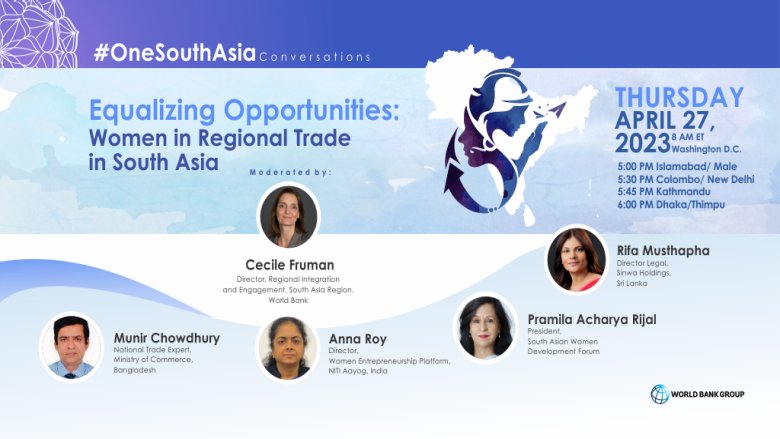Join us on April 27, 8 am. The event will be live streamed on this page. No preregistration is required. 5:30pm Colomobo & New Delhi l 5:45 pm Kathmandu l 6pm Dhaka
Our 15th #OneSouthAsia Conversation will explore ways to bridge gender gaps in intraregional trade and entrepreneurship in South Asia and lay out pathways that will further integrate women in economic growth across the region. It will explore opportunities and impediments to more inclusive trade and businesses, with a focus on cross-border approaches and how womenˇŻs participation can be strengthened. The online conversation will dive into the role of effective policies at national and regional levels, regional trade agreements, and insitutional platforms that can help overcome the gender gaps. Join our panelists from policy circles, research, and women entrepreneurs who are leading the way on this.
BACKGROUND: In South Asia, a key limitation to greater economic growth and development is the lack of womenˇŻs economic empowerment. The region has the second-lowest regional female labor force participation (FLFP) rate at 22% for women against 77 % for men (second only to the Middle East and North Africa). Even in South Asian countries with a high FLFP rate, womenˇŻs rate of vulnerable employment remains significant. More than half of working women in South Asia work are in the informal sector, which is often characterized by low wages, lack of social protection and no legal recognition.
Studies have also shown that women are generally excluded from most trade activities and when women are involved, they are mostly related to the lower and less remunerative levels of production value chains, while men occupy the higher-level segments of the value chain. They face barriers to participate in value chains, at the societal, community and individual levels, limiting the overall potential growth of interregional trade and economic growth. Their roles in value chains lack visibility and are mostly seen as supporters and helpers rather than key players. Women also lack venues and opportunities to market their products and engage in cross-border trade and opportunities.
In the region, they are also barriers to entrepreneurship. The rate of female ownership of firms is at (2021). Access to finance and digital access remain key impediments- for example the gender gap in account ownership at formal financial institutions is at .
TOP MESSAGES:
- South Asia had the second-lowest regional female labor force participation (FLFP) rate at 22% for women against 77 % for men.
- also the lowest rate of female ownership of firms- and 50% in Latin America and Caribbean. (2021)
- In South Asia, women are 18 percentage points less likely than men to have a mobile phone.
- Women in the region are 36 percent less likely to use mobile internet than men.
- Women in the region are 11 percent less likely to have a financial account as compared to men.
- In South Asia, about three-quarters of STEM students are male.
- Across the region, women employees represent only energy sector staff.
- According to IFC research, women in comprise only 7 percent of senior investment professionals across private equity and venture capital in South Asia, of which 95 percent are from India.
- Pandemic-related school closures threaten to reverse the significant progress made in educational attainment in the region. Studies conducted early in the pandemic documented that girls were more likely than boys to spend increased time on household chores throughout the pandemic, leaving less time for schooling (Baird et al. 2020).
- Low programmatic efforts to increase womenˇŻs economic empowerment in male-dominated sectors have resulted in low FLFP rates in areas such as trade, Science, Technology, Engineering and Math (STEM) fields in the SAR.





